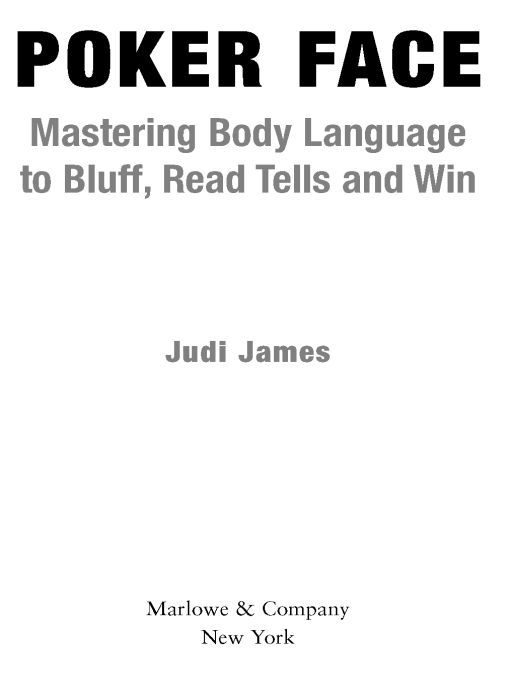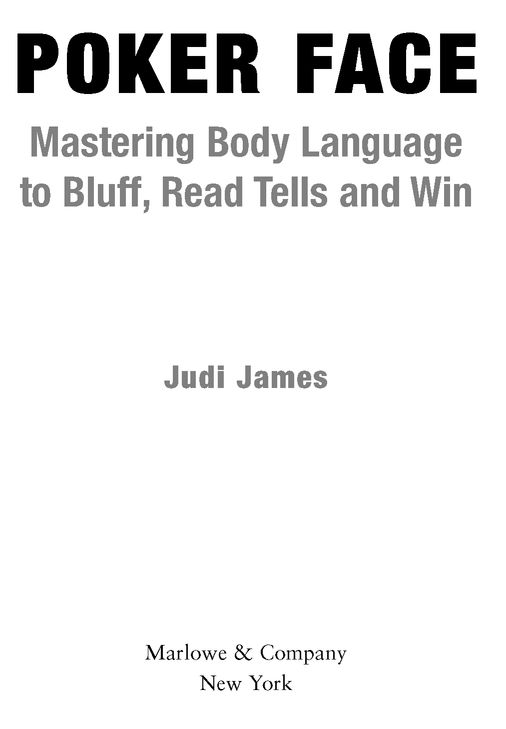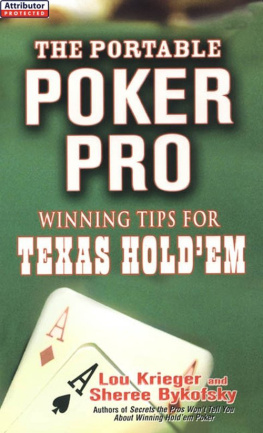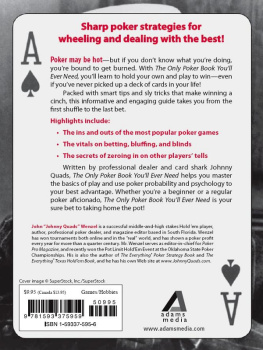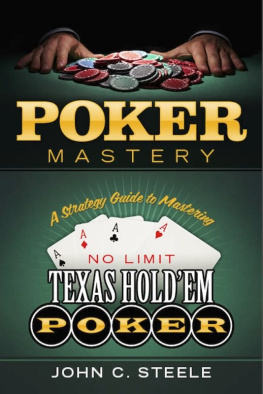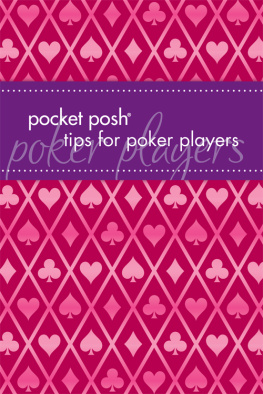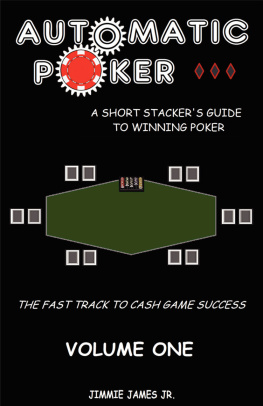Table of Contents
JUDI JAMES is a leading TV expert in body language, relationships, social behavior, stress and time management, image, workplace culture, and communication skills. Beginning her career as a catwalk model, she has since trained many big names at her modeling school, including Naomi Campbell. With a journalism and PR background, she has authored nine books on body language and social behavior, as well as numerous articles and columns for popular magazines. James lives in London.
INTRODUCTION
Poker is one of the greatest games of simple psychology ever invented. In many ways its all about lying. Whereas other card games are largely one-dimensional, with tension and success reliant on a combination of chance and skills of focus and memory, poker throws another vital and dramatic dimension into the pot.
Winning at poker is like winning at life. To play well you need more than a lucky hand. That exciting extra dimension is all about people skills: having the ability to read your opponents body language and block their attempts to read yours. All of this can be subconscious. You might not even know youre assimilating all these subtle complex signals. But by reading this book youre going to find out how to make it a conscious process. Then, instead of getting a feeling about another player and whether theyre bluffing or not, youll be able to work analytically to cut down the chances of making a mistake by random assessments.
Poker skill can be neatly divided into two categories: play skill and psychological skill. The game itself might be simple but the psychology of bluffing and unmasking the bluffs is satisfyingly complex. This book is going to explain all about the body language skills necessary to play poker and win. And, as a bonus, youll be learning how to read other people in life in general. Unmasking a liar isnt just reserved for the poker table!
WHO NEEDS TO READ IT?
I make no assumptions about your poker skills or experience. This book is aimed at new players, professional players and all those in between. You could play for peanuts or Smarties with your aunty and uncle, or you could be chomping stogies and playing for zillions in some dimly lit gambling den for all I care. You might not even have started to play poker yet, in which case Id suggest you give the gambling den a wide berth, at least until youve learned the basics. This book will also be extremely useful for people who have absolutely no interest in poker (although it will have been an odd choice of purchase as it has the word poker in the title).
IF ITS THAT EASY WHY DONT YOU CLEAN UP AT POKER?
The first question everyone asks a clairvoyant or psychic is: Can you predict the winner of the Super Bowl? Im not sure what the stock answer is but it is generally along the lines of not wanting to use my talent for personal gain. So what I could say is that it wouldnt be ethical to employ my unique powers as a body language expert at the poker table as it would give me an unfair advantage. But of course, that would be nonsense.
For one thing, Im not that virtuous. If body language were a precise science and if I were a better actor and if I had nerves of steel and a ruthless streak youd find me in Las Vegas cleaning up. But Im not. So heres the deal: I have been studying and writing about body language for over 20 years. Most of my work is done in the world of business. A year ago I was asked to give body language tips on a DVD about poker. And suddenly I discovered a whole new outlet for body language skills. It was a little like Stephen Hawking discovering his theory of space-time could be used to win at Monopoly.
I decided to start by seeing whats already around in terms of advice. One thing I discovered was that most of the great bibles of poker currently on the market are too technical for people with a short attention span.
Tips on poker body language tend to come from experienced poker players who learned their psychological skills around the poker table. They look from the inside out. This is fine, but I needed to explore from the opposite direction. Im looking from the outside in. Im a body language expert who is applying her knowledge here to one specific use.
GEEK IS THE NEW POKER CHIC
What I also considered is the new breed of poker players that are flooding the market:
Office workers - who already know a lot about body language because they sit in meetings all day trying to look as though they know what theyre talking about.
Younger people - who dont want to wear Stetsons and sun glasses and sit counting the beads of sweat on their opponents faces or watching exactly how they crumble their Oreo cookies when theyre placing a bet.
The link between business skills and poker skills is obvious and its probably why poker has become the pastime of choice for so many young professionals. What you hone at work you use around the poker table and what you learn around the poker table you use to improve your performance at work.
If you want to be Paul Newman or Clint Eastwood then this book isnt for you. If you want to take some of your business skills of bluffing, influencing and unmasking and apply them to the art of winning at poker then it is the real deal.
ONLINE POKER
Online poker is one of the most popular games in the US. And both Internet and celebrity games are fueling a passion for poker and creating a newer, younger generation of players who cut their teeth online but then progress to the real thing as their confidence and interest grows. For example, Chris Moneymaker won the World Series of Poker having begun his playing career only a few years before, gambling on the Internet. He had been inspired by watching the Matt Damon film Rounders.
I have included a chapter about the psychology of playing poker on the Internet. It could seem on the surface that online play makes the need for poker faces and visual bluffs redundant, in the same way that telephones and e-mails impacted our conversations by appearing to remove the need for body language. And yet body language and nonverbal communication will always survive any form of electronic communication you care to throw at it. Honestly.
How do I know? Well, I bet you still use your hands when youre speaking on the phone. And thats not just some simian-throwbackstyle trait. However anonymous we make our communications, the recipients will always crave to dig deeper and get to the truth. Dont tell me you never pondered over a very simple e-mail message wondering what the sender really meant? We still like to pick up on smaller details to give clues about the person talking.
On the phone we listen to the changes in the timbre of the voice and the subtle rhythms of breathing and speech to tell if someones stressed or hiding the truth. Online players tend to swear by odds and logic but theres still scope for psychology. Theyre tuned in to the length of pauses before play and the chat-box messages. Even the names that players adopt are used to glean clues about them.
Plus, if you play hours of online poker, you can unconsciously form body language habits that would give you away in a real table game.
HOW TO USE THIS BOOK
This book is written in two parts. Part one focuses on you. Self-knowledge and self-examination are fascinating and critical. During this section well study everything to do with bluffing, lying and your poker performance, including understanding your own motivations and approach to the game, which will in turn have a crucial impact on your performance success. Part two will place your opponents under the microscope. Well see how they bluff and why they bluff and how to spot clues that will reveal what theyre really thinking or planning. To start, in chapters 1 and 2, I lay out the background to everything youre about to learn.

